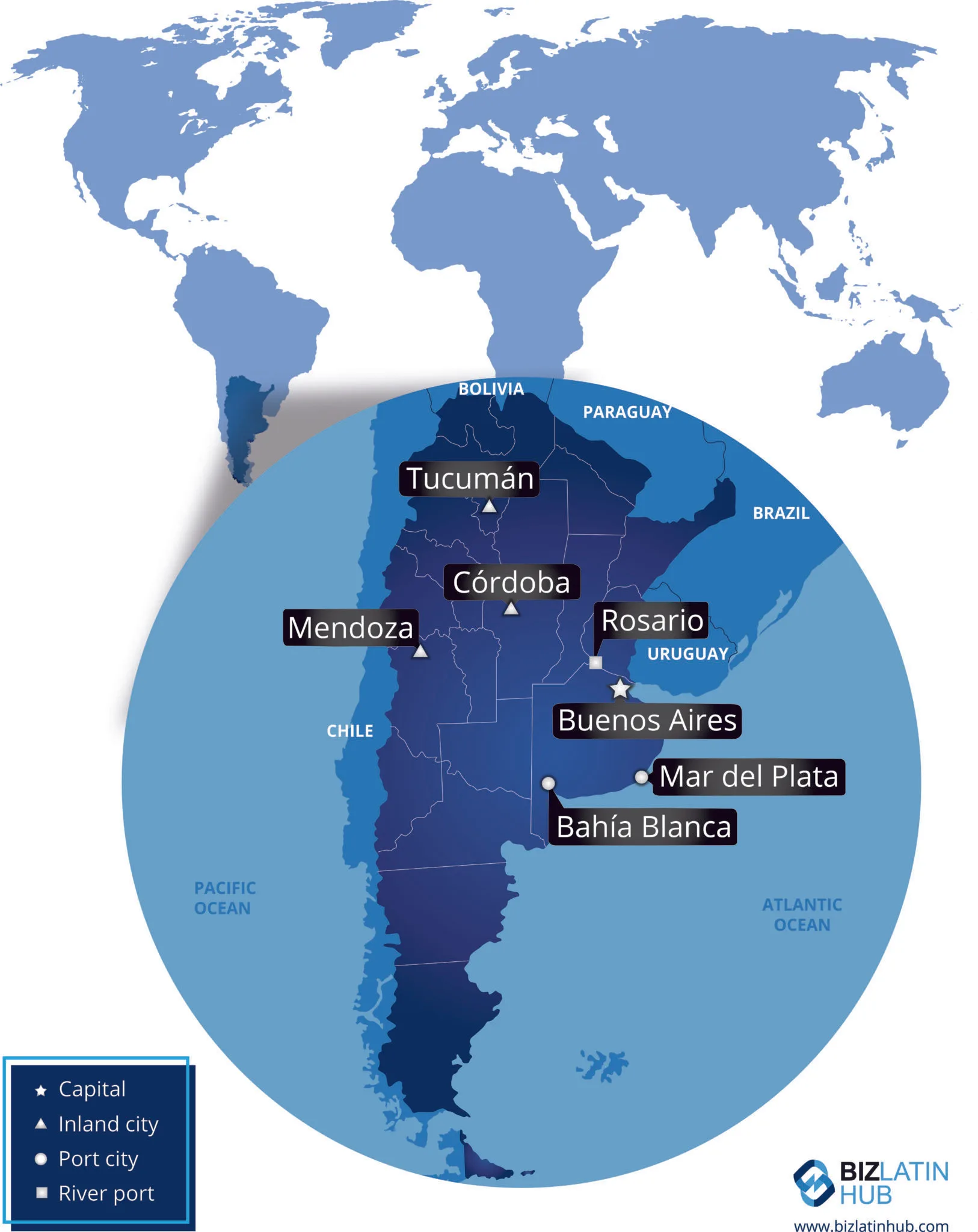If you are looking to incorporate a company in Argentina, you are going to need a fiscal address, even if your business requires no physical office. Because when doing business in the South American country, it is a statutory obligation for a company to have a fiscal address in Argentina, where you will receive official documents and communications, and which is where you will be registered for taxation purposes.

Argentina is Latin America’s third-largest economy and one of the main recipients of foreign direct investment (FDI) in the region, recording FDI inflows of $6.66 billion in 2019 (all figures in USD unless otherwise stated). That year, the South American nation reported a gross domestic product (GDP) of $449.7 billion and reached a gross national income (GNI) of $11,130 per capita — a figure that places it as an upper-middle-income country, according to classifications established by the World Bank.
The country boasts a large and well-established middle class and a strong educational system, and has the highest English language proficiency among non-English speaking countries in the region.
Argentina is also a founder member of the Southern Common Market (Mercosur) — a political and economic regional bloc that also includes Brazil, Paraguay, and Uruguay, and which recently commemorated its 30th anniversary since its foundation. Some of Argentina’s main export commodities are soybeans and related products, corn, vehicles, and beef.
If you are considering expanding into Argentina to take advantage of business opportunities in the country, read on to understand the importance of getting a fiscal address in Argentina. Or go ahead and contact us now for specialist advice.
Why do you need a fiscal address in Argentina?
Your company’s fiscal address in Argentina will usually be the base of your operations in the country, where the commercial, managerial, and administrative activities of your organization will be carried out. That fiscal address is the place that will be registered with local tax and administrative authorities, including the Government Administration of Public Revenues (AGIP) and the Federal Agency of Public Revenues (AFIP).
In the event that you are running or intending to form a company in Argentina that does not require a physical premises, you will still need to have a fiscal address to receive such official correspondences, and a back-office services provider will be able to offer you an address to that end — which will often be the address of their own main office.
Note that any notification made to your fiscal address by the AGIP or AFIP will be considered valid, even if it was not personally delivered to the official taxpayer of your company.
Beyond receiving official correspondences from local authorities, you will also need a fiscal address in Argentina for the following processes:
• Company registration before the General Inspection of Justice (IGJ)
• Opening of a corporate bank account
• Participation in tenders

Choosing the entity to base for your fiscal address in Argentina
If your fiscal address in Argentina will be the physical location of your business operations, you will need to decide which type of entity best suits your needs. If you are unsure about the types of legal structures in Argentina to choose from, you may wish to seek out the advice of a local expert, who can advise you based on your business goals and needs.
The most common types of legal entities in Argentina and the main requirements to establish them include:
Public Limited Company: A public limited company — known as a Sociedad Anónima (S.A.) in Spanish — requires that the majority of its shareholders reside in Argentina and has a minimum investment capital of ARS$100,000 (approximately $1,079 at time of publication). Such a structure requires that an annual shareholders’ meeting is held to assess the financial condition of the organization.
Limited Liability Company: A limited liability company — called a Sociedad de Responsabilidad Limitada (S.R.L.) in Spanish — requires a minimum of two shareholders for its creation and a maximum of 50. There is no minimum capital required to form this type of company.
Simplified Stock Company: A simplified stock company — referred to as a Sociedad Anónima Simplificada (S.A.S.) in Spanish — requires that the capital be made up of shares. The minimum amount to form this type of company must be equal to twice the Argentine minimum wage, which at the time of publication was ARS$21,600 (approximately $222). Meaning the company can be established for under $450.
6 key steps to form a company in Argentina
Once you decide what type of legal entity you want to establish, you can begin the company formation process, and the main base of operations will likely be designated your fiscal address in Argentina. You will need to follow six steps to form a company in the country, including:
Step 1: Draw up and sign a power of attorney
You will need to draw up and sign a power of attorney (POA) that authorizes your legal representative to incorporate a legal entity on your behalf and establish a legal domicile in Argentina.
Step 2: Obtain a signature certificate from the company’s shareholders
After drawing up the POA, you will need to certify the signatures of the shareholders of your company before a notary public.
Step 3: Create the company bylaws
Once the signature certificate is legalized, you will have to draft the bylaws of your company, specifying the objectives of your organization.
Step 4: Register your company with the Public Registry of Commerce
With the first three steps completed, in order to form a company and designate your fiscal address in Argentina, you will have to register your organization before the Public Registry of Commerce.
Step 5: Request and obtain your company’s tax identification number (CUIT)
Requesting and obtaining your company’s tax identification number (Código Único de Identificación Tributaria – CUIT) is the next step and can be done through the website of the Federal Administration of Public Revenues (AFIP).
Step 6: Open a corporate bank account
The final step to starting a business in Argentina is to open a corporate bank account with a local bank, where you will deposit the necessary capital.
Biz Latin Hub can help you get a fiscal address in Argentina
At Biz Latin Hub, we can provide you with a fiscal address should you need. Alternatively, our multilingual team of company formation agents can help you establish your commercial presence and register your new offices as your fiscal address in Argentina, as well as help you navigate the country’s regulatory framework to ensure your organization remains in good standing with local authorities. With our complete portfolio of commercial representation, legal, and accounting services, we can be your point of contact to incorporate and manage your business in Argentina and any of the other 15 markets across Latin America and the Caribbean where we are present.
Reach out to us now to discuss your business options.
Learn more about our team and expert authors.






